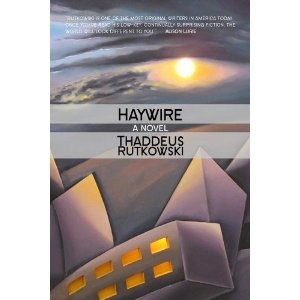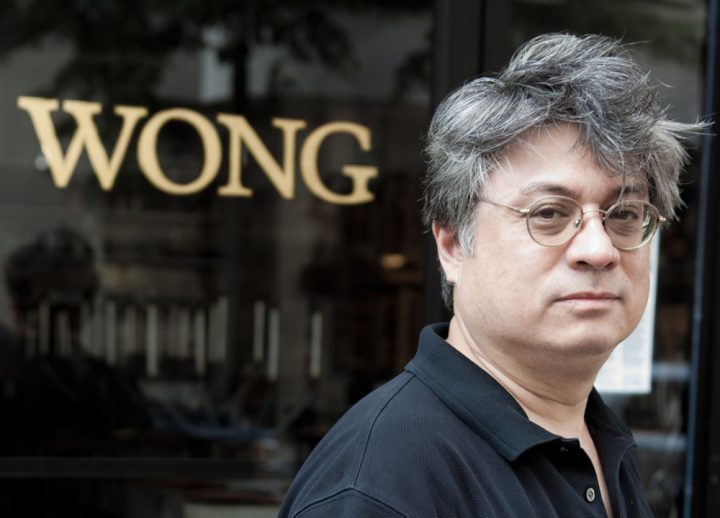By Jhon Sánchez
I met Thaddeus Rutkowski more than twenty years ago when I was a newcomer to this country. At that time, I was taking ESL classes and went to a poetry reading at a bar by Union Square—It was the iconic Cedar Tavern, wasn’t it? There, Thad recited a poem about his name. I always remember the poem when I write my own name with its strange spelling: Jhon. I never saw him again. But in 2017, I had a story published in New Found, and so did Thad. By then, I had completely forgotten his name. I invited him to come to my class. There, he talked about the creative process and read a couple of poems. The last poem that he read was the same poem I had heard twenty years ago. So I said to myself, “That’s the guy.”
Thad, Thank you for accepting my invitation to talk about Haywire.
JS: Could you remind me of the title of the poem I mentioned before and talked about how being Polish-Chinese has influenced your writing, especially your novel Haywire?
TR: The title of the piece you heard is “What’s in the Name.” It’s more of a poetic prose piece than a poem, because it’s written in sentences and paragraphs. Oddly, the piece doesn’t appear in any of my full-length books, but it has been published a couple of literary magazines and in a chapbook, White and Wong.
One of the main themes in my writing is my identity and my ethnic background. I’m more Polish-American than Polish, since my father was born in the U.S. and didn’t speak Polish (his parents did). My mother was born and raised in China, in what is now the People’s Republic, and immigrated to the U.S. when she was 18 to go to college, where she met my father. In much of my “fiction,” there is a narrator and the narrator’s parents, who are derived from my mother and father.
JS: Most of your writing, at least the ones I’ve read are snapshots or flash fiction that you assembled into a larger narrative. How did you acquire that style?
TR: I write in the style of flashes, vignettes, snapshots, or even “fractals” (in my book Tetched, a Novel in Fractals). These building blocks are all the same in the sense that they are discrete units. Each contains an image or incident or conversation that seems to stand alone. I have naturally or instinctively written in this style since I was a teenager; it seems the easiest way to express what I want to say.
I put these pieces together in a very deliberate way, so that they are in a chronological and/or thematic order. I want the action to build, or the situation to develop into a dramatic arc. This arc is not conventional, with rising action, climax, and falling action, but there are ups and downs—mishaps sprinkled with a few lucky occurrences.
 JS: I read the book from cover to cover but afterward felt like I could have also read it at random. Do you think your novel also appeals to readers who read on their cellphones and don’t want the commitment of reading a whole book? If so, how do you feel about that?
JS: I read the book from cover to cover but afterward felt like I could have also read it at random. Do you think your novel also appeals to readers who read on their cellphones and don’t want the commitment of reading a whole book? If so, how do you feel about that?
TR: I’ve never read a book on a cellphone. But it’s true, you can read chapters at random. Each chapter was written as a separate story, and the chapters were not written in the order that they appear. Many were published separately in literary journals.
I’m happy for anyone to read the book in any manner they choose. It’s available in a Kindle edition, and while I proofread the book on an electronic tablet, I don’t read Kindle books now. I think the Nook tablet we got for our daughter is out of commission.
JS: The first part of the book focuses on the main character’s life during his childhood until he went to college. Reading the book as a foreigner, I learned a lot about American society. Are the character’s desires and aspirations a reflection of societal values in the USA?
TR: At one point early in the book, the narrator (a boy) and his siblings want to move to a ranch-style split-level home. Their father, on the other hand, wants to stay where they are, in an old, rural house that had been heated with potbellied stoves (the heating system has been upgraded to a soft-coal furnace). The house has a (nonfunctioning) outhouse/privy in the back yard. I suppose that desire to move to a town or a suburb reflects an American aspiration.
As it happens, the narrator moves from the country to a city, New York, because he has had enough of the country. I suppose this switch also reflects an aspiration—for central heat that doesn’t require shoveling coal into a furnace, at least. Even so, one of the places the narrator ends up in has a gas heater mounted in a window frame. The gas heater “explodes” at random moments. The American dream is still on hold at this point.
JS: Would you agree that during the second and third parts of the book, the character continues with his search to fit in?
TR: Most of the book is about trying (and often failing) to fit in. But a sense of belonging can also come from oneself. You should be comfortable with yourself, and I believe the narrator gets to this state by the end.
Here’s true story (not in the book). While traveling to or from work in Manhattan one day, I wanted to get on a subway car, and a man standing at the door said, “You don’t fit.” I stepped back onto the platform and let the train go. I thought the man had meant, “You don’t belong,” but when I thought about it, I realized he’d meant there wasn’t enough room in the crowded train car for me to get in and stand. I’d felt insulted, but needn’t have felt that way.
JS: Many times, I asked myself if this novel was a memoir. Can you comment on that?
TR: My writing is based on my experience. You might call it “autobiographical fiction.” I see there is a kind of fiction called “autofiction,” and this book (along with others) would fit into this category. However, I juice up my experience to make it more intense or dramatic. I try to make each scene more vivid or hard-hitting, and to put scenes together so the cumulative effect is more compressed than in real life.
JS: Reading your book, I thought about parenthood. Would you agree that the character’s ideas of being a father differ from his parents’?
TR: The father in the book is a teacher, and he tries to impart what he knows to his children. He is quite firm about what he knows, and his interests are wide ranging, from literature and art to politics. His questionable judgment often gets in the way of parenting.
As a father, the main character also tries to give help and advice, though his daughter is quite young here. However, the character’s learned tendencies might work against the family norm. Still, the result is a family that is together, travels together, spends time together.
JS: Do you feel your novel addresses controversial topics with a sense of humor?
TR: Yes, there are a number of controversial topics in the book. They have to do with character and lifestyle. The father has the idea to live self-sufficiently, for example. We might think that growing one’s own food, or hunting for it, is a questionable way to live.
Later, the idea of going to open-mic poetry readings might seem an odd way to spend one’s time.
Also, dreams have importance here. Several of the later chapters are dream sequences. I believe that subconscious-thought patterns open a window onto waking life, though the relation between the states is mysterious.
JS: Without giving anything away, the last line of the novel reads: “On my way up the mountain, I find that the slope is not only steep, it’s vertical. There’s a steel ladder I can hold onto, but even when I’m holding on, I’m afraid of falling. I look for a place to rest, a flat area where I can get off the ladder. But I don’t see any ledges wide enough to stand on. Moving sideways would lead to empty air. So I keep climbing.” What’s the next step on the ladder for you?
TR: I am always climbing the ladder, whatever it is, and wherever it leads. One (anyone) can never be satisfied, because nothing is ever finished. I had a neighbor years ago when I lived at the South Street Seaport. I don’t remember what he did for a living, but he was one of several artists, including Mark di Suvero, who lived in that building. This neighbor used to say, “Rest is rust.” I believe that.
JS: The characters have no names, except for Jade, the main character’s daughter. Could you tell her I want to hear more from her? She’s a jewel.
TR: Our daughter appears in all of my books after Haywire. There are three later titles: Guess and Check (whose title comes from our daughter’s method of solving tough math problems. You “guess” at the answer, then “check” to see if it works in the equation), Violent Outbursts, and Border Crossings.
Our daughter is now a college sophomore, majoring in environmental studies and visual art. We always look forward to her visits.
Thaddeus Rutkowski is a graduate of Cornell University and The Johns Hopkins University. He is the author of six books: the novels Haywire, Tetched and Roughhouse; a collection of flash fictions, Violent Outbursts; a creative memoir, Guess and Check; and a collection of poetry, Border Crossings. Haywire won the Members’ Choice Award from the Asian American Writers’ Workshop.
He received a 2012 fellowship in fiction writing from the New York Foundation for the Arts and served as a panelist for the 2017 NYFA nonfiction fellowships. He teaches at Medgar Evers College and the Writer’s Voice of the West Side YMCA.
His writing has appeared in The New York Times, The International Herald Tribune, and The Outlaw Bible of American Poetry, as well as in Copper Nickel, CutBank, Hawaii Pacific Review, Hayden’s Ferry Review, Faultline, Fiction, Fiction International, Iron Horse Review, Pleaides, Potomac Review, Sou’wester, and many other magazines. His work has been nominated for the Pushcart Prize, Best Small Fictions, and Best American Short Stories.
Jhon Sánchez: A native of Colombia, Mr. Sánchez arrived in the United States seeking political asylum. Currently, a New York attorney, he’s a JD/MFA graduate. His most recent short stories are Pleasurable Death available on The Meadow, The I-V Therapy Coffee Shop of the 21st Century available on Bewildering Stories and “‘My Love, Ana,’—Tommy” available on https://www.fictionontheweb.co.uk/ . On July 1st, The Write Launch released his novelette The DeDramafi, which will be also reprinted by Storylandia in 2021. He was awarded the Horned Dorset Colony for 2018 and the Byrdcliffe Artist Residence Program for 2019.










